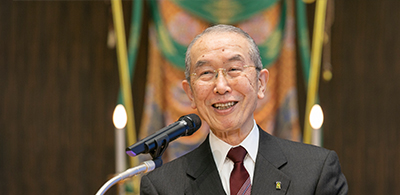Nothing Is without Purpose
August 2020

Diligence Helps Us Refocus on Becoming Buddhas
The other day someone asked me, “What do I need to do in order to become a buddha? What sort of practice or plan is best?” Since Buddhism is sometimes explained as “teachings in order to become a buddha,” the question does seem to be, “what should we do to attain that goal?”
However, when we delve deeply into chapter 16 of the Lotus Sutra, “The Life Span of the Eternal Tathagata,” we see that our diligence is not for the sake of becoming buddhas. So, in response to the person who asked this, I said the following:
“Becoming a buddha may be defined as ‘attaining awakening,’ but in that sense, we’re taught that we’re already awakened. Therefore, rather than saying that we’re engaged in a particular practice or plan for becoming buddhas, we should really say that after having awakened, we’re continuing to practice diligence through the way we lead our daily lives.”
The reason we continue to be diligent is because we sometimes forget our essential nature. Making this effort to return to our awakened, true selves is, in itself, living the faith from one day to the next.
Life is full of various anxieties and sufferings, but when we believe in our own awakened selves and those of other people (the self of others*) and are diligent together, this world in its present form becomes the Realm of Tranquil Light. Only by encountering such teachings of the Buddha and thereby becoming aware of the preciousness of life can we spend each and every day grateful. Unfortunately, however, we sometimes forget our happy selves and suffer.
As If It Were Your Own
There is a line in “The Life Span of the Eternal Tathagata” that goes like this: “the sutras expounded by the Tathagata are all for the purpose of liberating living beings.” In other words, all the Buddha’s teachings are for the sake of liberating people from the world of delusions.
It may sound difficult to liberate living beings from the world of delusions, but this simply means that we need to become human beings who are always–and from the heart–happy, joyful, and pleasant. As long as we don’t forget our essential nature, we can experience such happiness.
In this regard, the Buddha gives us hints, in different forms or through different things, about how we can remove ourselves from the world of delusions. The scripture tells us that skillful means are innumerable, but it’s important to remember that these are not only the teachings of the saints and the wise, but also all the different events that happen in the world–both good and bad. These become hints, causes, or conditions that help us return to our true selves and experience happiness.
Some people may become aware of their true selves through an injury or illness, while others may awaken and call forth their mind of compassion after first becoming able to understand someone else’s pain. Furthermore, if you witness another person’s happiness and feel so happy yourself–as if it were your own–that you’re moved to tears, it’s probably because your buddha-nature is manifesting itself.
The Buddha wants all people to be liberated and become happy. By practicing with accepting the sadness and happiness of other people as our own, we come to realize that the Buddha’s wish is deeply planted in our own minds.
Global phenomena such as the spread of COVID-19 teach us many things. If we accept such events and learn from them, nothing in this world is without purpose and every single thing helps us return to our awakened true selves–in other words, to buddhas.
As an aside, those who pray for the happiness of people around the world and take it upon themselves to think about people in distant countries are, in a manner of speaking, members of a global sangha who all share the same wish.
The mind of devotion of we who believe in the buddha-nature of ourselves and others–in other words, our religious faith–forms the starting point for spreading true happiness throughout the world.
※ “The self of others” (Jpn., tako) means “other people and all existence.” This phrase appears in Shobogenzo (Treasury of the True Dharma Eye) by Dogen, founder of Zen’s Soto school. Dogen taught that when we see ourselves and others as one, everything that exists outside one’s self is “the self of others,” which then unites with “one’s self.”




